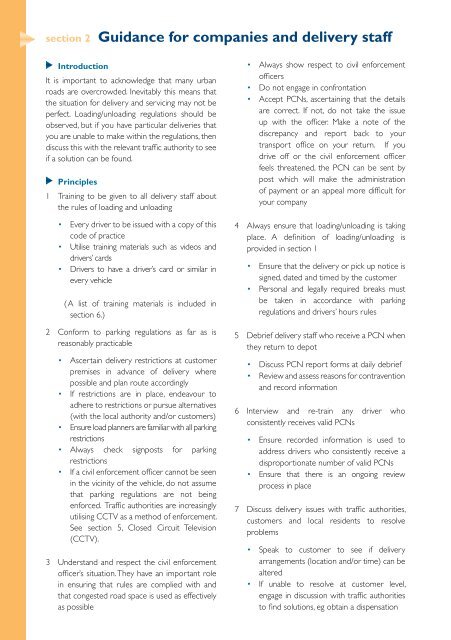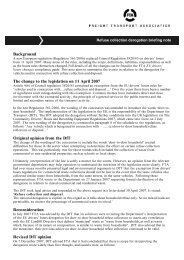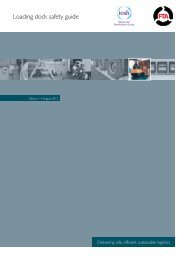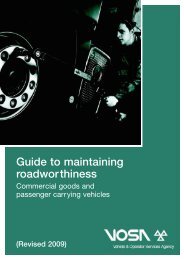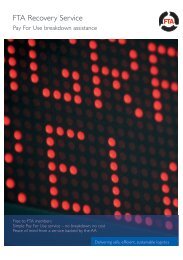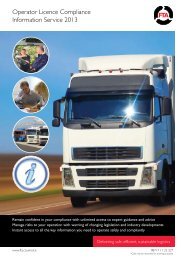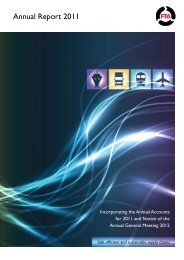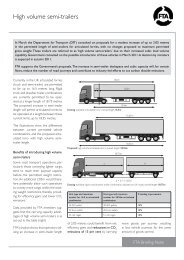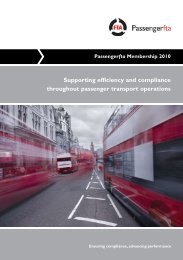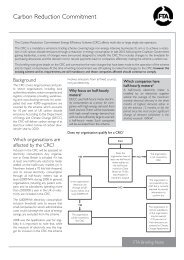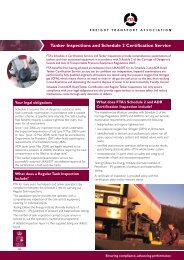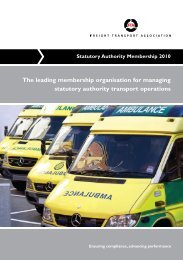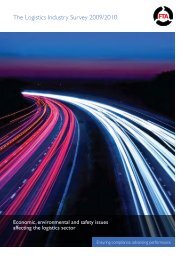loading/unloading code of practice - Freight Transport Association
loading/unloading code of practice - Freight Transport Association
loading/unloading code of practice - Freight Transport Association
- No tags were found...
You also want an ePaper? Increase the reach of your titles
YUMPU automatically turns print PDFs into web optimized ePapers that Google loves.
section 2 Guidance for companies and delivery staffIntroductionIt is important to acknowledge that many urbanroads are overcrowded. Inevitably this means thatthe situation for delivery and servicing may not beperfect. Loading/un<strong>loading</strong> regulations should beobserved, but if you have particular deliveries thatyou are unable to make within the regulations, thendiscuss this with the relevant traffic authority to seeif a solution can be found.Principles1 Training to be given to all delivery staff aboutthe rules <strong>of</strong> <strong>loading</strong> and un<strong>loading</strong>• Every driver to be issued with a copy <strong>of</strong> this<strong>code</strong> <strong>of</strong> <strong>practice</strong>• Utilise training materials such as videos anddrivers’ cards• Drivers to have a driver’s card or similar inevery vehicle(A list <strong>of</strong> training materials is included insection 6.)2 Conform to parking regulations as far as isreasonably practicable• Ascertain delivery restrictions at customerpremises in advance <strong>of</strong> delivery wherepossible and plan route accordingly• If restrictions are in place, endeavour toadhere to restrictions or pursue alternatives(with the local authority and/or customers)• Ensure load planners are familiar with all parkingrestrictions• Always check signposts for parkingrestrictions• If a civil enforcement <strong>of</strong>ficer cannot be seenin the vicinity <strong>of</strong> the vehicle, do not assumethat parking regulations are not beingenforced. Traffic authorities are increasinglyutilising CCTV as a method <strong>of</strong> enforcement.See section 5, Closed Circuit Television(CCTV).3 Understand and respect the civil enforcement<strong>of</strong>ficer’s situation. They have an important rolein ensuring that rules are complied with andthat congested road space is used as effectivelyas possible• Always show respect to civil enforcement<strong>of</strong>ficers• Do not engage in confrontation• Accept PCNs, ascertaining that the detailsare correct. If not, do not take the issueup with the <strong>of</strong>ficer. Make a note <strong>of</strong> thediscrepancy and report back to yourtransport <strong>of</strong>fice on your return. If youdrive <strong>of</strong>f or the civil enforcement <strong>of</strong>ficerfeels threatened, the PCN can be sent bypost which will make the administration<strong>of</strong> payment or an appeal more difficult foryour company4 Always ensure that <strong>loading</strong>/un<strong>loading</strong> is takingplace. A definition <strong>of</strong> <strong>loading</strong>/un<strong>loading</strong> isprovided in section 1• Ensure that the delivery or pick up notice issigned, dated and timed by the customer• Personal and legally required breaks mustbe taken in accordance with parkingregulations and drivers’ hours rules5 Debrief delivery staff who receive a PCN whenthey return to depot• Discuss PCN report forms at daily debrief• Review and assess reasons for contraventionand record information6 Interview and re-train any driver whoconsistently receives valid PCNs• Ensure recorded information is used toaddress drivers who consistently receive adisproportionate number <strong>of</strong> valid PCNs• Ensure that there is an ongoing reviewprocess in place7 Discuss delivery issues with traffic authorities,customers and local residents to resolveproblems• Speak to customer to see if deliveryarrangements (location and/or time) can bealtered• If unable to resolve at customer level,engage in discussion with traffic authoritiesto find solutions, eg obtain a dispensation


